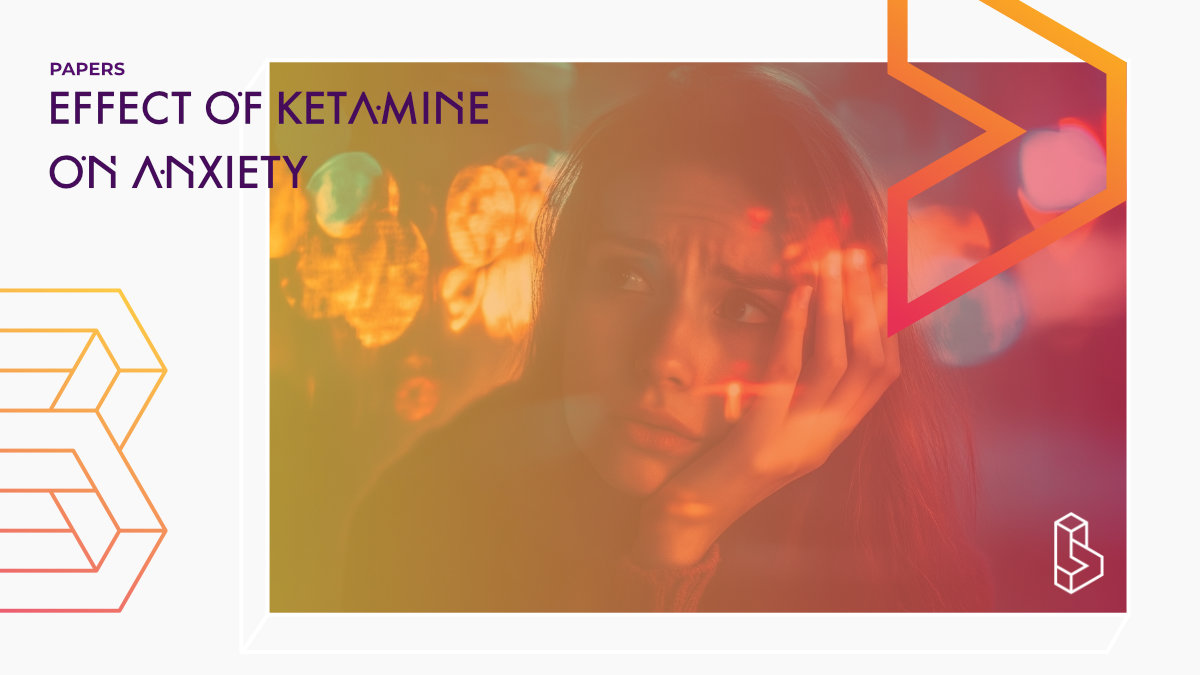This secondary analysis of a Phase III trial (n=174) evaluates the effects of subcutaneous ketamine on anxiety in treatment-resistant depression (TRD). Significant reductions in anxiety (HAM-A scores) were observed in cohort 2 with flexible dosing (35-63mg/70kg) but not in cohort 1 with fixed low dosing (35mg/70kg). These effects, mediated by changes in depression (MADRS), were not sustained 4 weeks post-treatment.
Abstract of Effect of ketamine on anxiety (KADS)
“Background Anxiety disorders and treatment-resistant major depressive disorder (TRD) are often comorbid. Studies suggest ketamine has anxiolytic and antidepressant properties.
Aims To investigate if subcutaneous racemic ketamine, delivered twice weekly for 4 weeks, reduces anxiety in people with TRD.
Method The Ketamine for Adult Depression Study was a multisite 4-week randomised, double-blind, active (midazolam)-controlled trial. The study initially used fixed low dose ketamine (0.5 mg/kg, cohort 1), before protocol revision to flexible, response-guided dosing (0.5–0.9 mg/kg, cohort 2). This secondary analysis assessed anxiety using the Hamilton Anxiety (HAM-A) scale (primary measure) and ‘inner tension’ item 3 of the Montgomery–Åsberg Depression Rating Scale (MADRS), at baseline, 4 weeks (end treatment) and 4 weeks after treatment end. Analyses of change in anxiety between ketamine and midazolam groups included all participants who received at least one treatment (n = 174), with a mixed effects repeated measures model used to assess the primary anxiety measure.
Results In cohort 1 (n = 68) the reduction in HAM-A score was not statistically significant: −1.4 (95% CI [−8.6, 3.2], P = 0.37), whereas a significant reduction was seen for cohort 2 (n = 106) of −4.0 (95% CI [−10.6, −1.9], P = 0.0058), favouring ketamine over midazolam. These effects were mediated by total MADRS and were not maintained at 4 weeks after treatment end. MADRS item 3 was also significantly reduced in cohort 2 (P = 0.026) but not cohort 1 (P = 0.96).
Conclusion Ketamine reduces anxiety in people with TRD when administered subcutaneously in adequate doses.”
Authors: Natalie T. Mills, Stevan Nikolin, Nick Glozier, David Barton, Bernhard T. Baune, Paul B. Fitzgerald, Paul Glue, Shanthi Sarma, Anthony Rodgers, Dusan Hadzi-Pavlovic, Angelo Alonzo, Vanessa Dong, Donel Martin, Philip B. Mitchell, Michael Berk, Gregory Carter, Maree L. Hackett, Andrew A. Somogyi, Cathrine Mihalopoulos, Mary Lou Chatterton, Sean Hood, Colleen K. Loo
Summary of Effect of ketamine on anxiety (KADS)
Anxiety disorders and treatment-resistant depression (TRD) are often comorbid, which complicates their treatment. Research has suggested that ketamine, a fast-acting NMDA receptor antagonist, possesses both antidepressant and anxiolytic properties. This study, titled the “Ketamine for Adult Depression Study” (KADS), explores the impact of subcutaneous racemic ketamine on anxiety symptoms in individuals with TRD. The primary goal was to determine whether ketamine reduces anxiety as measured by the Hamilton Anxiety Rating Scale (HAM-A) and the inner tension item (item 3) of the Montgomery-Åsberg Depression Rating Scale (MADRS). Secondary goals included understanding the dose-dependent effects of ketamine and its efficacy in participants with comorbid anxiety disorders.
Methods
Study Design
Find this paper
Effect of ketamine on anxiety: findings from the Ketamine for Adult Depression Study
https://doi.org/10.1192/bjp.2024.250
Open Access | Google Scholar | Backup | 🕊
Cite this paper (APA)
Mills, N. T., Nikolin, S., Glozier, N., Barton, D., Baune, B. T., Fitzgerald, P. B., ... & Loo, C. K. (2025). Effect of ketamine on anxiety: findings from the Ketamine for Adult Depression Study. The British Journal of Psychiatry, 1-7.
Compound Details
The psychedelics given at which dose and how many times
Ketamine 35 - 63mg | 1x
Linked Research Papers
Notable research papers that build on or are influenced by this paper
Economic evaluation of subcutaneous ketamine injections for treatment resistant depression: A randomised, double-blind, active-controlled trial - The KADS studyThis cost-utility analysis, alongside a randomized controlled trial (n=174), compared subcutaneous ketamine (twice-weekly for 4 weeks) with midazolam in treatment-resistant depression. Including midazolam costs, ketamine raised QALYs (0.435 vs 0.352) and was dominant with an 89–91 % chance of costing < $50 000/QALY, but once these comparator costs were excluded ketamine was no longer cost-effective (ICER ≈ $108 500–$251 250/QALY, ≤ 5 % probability).
Efficacy and safety of a 4-week course of repeated subcutaneous ketamine injections for treatment-resistant depression (KADS study): randomised double-blind active-controlled trial
This Phase III, double-blind, randomized trial (n=174) evaluated the acute efficacy and safety of a 4-week course of ketamine (35-63mg/70kg) in participants with treatment-resistant depression (TRD). The study found that ketamine was more efficacious than midazolam (1.75mg/70kg) in the flexible-dose cohort (remission rate 19.6% vs 2.0%), demonstrating that adequately dosed subcutaneous racemic ketamine is both effective and safe in treating TRD over 4 weeks.
Linked Clinical Trial
Ketamine for Adult Depression Study (KADS)This interventional trial (n=200) aimed to assess the effectiveness of ketamine therapy among patients with treatment-resistant depression in a double-blind, randomised, controlled setting.

